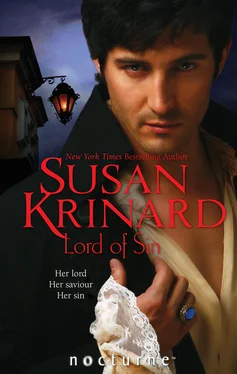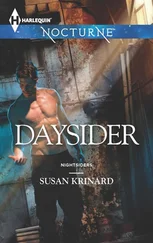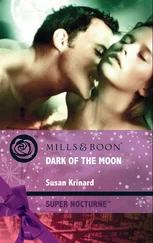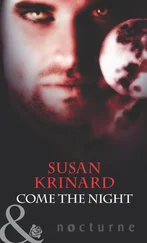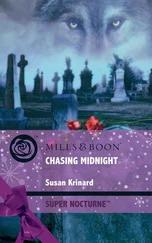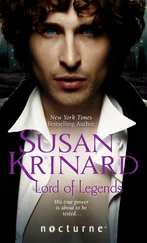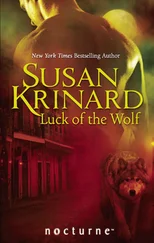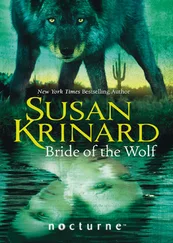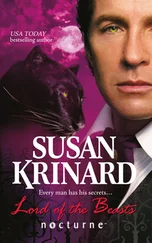Deborah stood up on her toes. “He isn’t there now.” She met Nuala’s gaze, her own filled with surprising disappointment. “He was…quite handsome, with fair hair and blue eyes.”
The sharp ache in Nuala’s chest eased. Not him . She had heard that he was recently returned to London from India. She knew their meeting was inevitable, but she was not ready to face the Earl of Donnington.
She forced her thoughts back to Deborah’s young man. Lady Orwell’s description might indicate any number of gentlemen in Society, and both she and Nuala were as yet unfamiliar with many of them. But Deborah’s tone was most interesting, most interesting indeed. It was almost as if she were amazed by the fact that she might be the object of a handsome young man’s attention.
“He must have noticed you,” Nuala said, relieved that her own feelings of being watched had proven unfounded. “Who would not?”
“Oh, no. It must have been you he was looking at.”
“You are by far the greater beauty, and I am past my prime.”
“But surely he noticed that I am in mourning.”
“Half-mourning. And even that will not prevent a man’s admiration.”
Deborah flushed. “Perhaps I ought not come out so often.”
“It is good for you, Deborah. Grief does not make the world go away, as much as you might wish it.”
“I wish that I might crawl into a black pit and never come out again.”
“No, you don’t.” Nuala took Deborah’s arm and linked it through hers. “You are not alone now. You will always be with one of us, wherever you go.”
“I feel safest with you.”
After much soul-searching, Nuala had taken on the role of a kind of mentor to Deborah. There was, of course, some risk; though Nuala’s magic was gone, she might conceivably live for many more years before she was granted the release of death.
It is only for Deborah’s sake , she reminded herself. Soon enough she’ll have no further need of me .
“I suggest that we continue to enjoy the paintings,” she said. “The others are well ahead of us.”
“Oh, yes. We should catch them up.”
Deborah hurried toward the beacon of Tameri’s gold collar. The Widows were laughing about something or other, drawing a few mildly disapproving stares. After all, truly well-bred women merely tittered, if they laughed at all. But in spite of her severe suit and upright bearing, Frances cared nothing for the opinion of Society. Nor did Clara, who had joined in her hilarity. Maggie was simply oblivious to the judgment of others. Their enjoyment of their joke even affected Deborah, who all but grinned in delight.
Yes, there was hope for the girl yet.
Clara smiled at Nuala. “Well,” she said, “we wondered where you had gone.”
“Deborah and I were merely watching the crowd.”
“Fascinating, isn’t it? The study of human nature is a most vital subject that has long been neglected.”
“Perhaps you ought to take up the study yourself, Clara.”
“Not I. I’m content with my microscope and telescope.”
Tools she would not have been permitted to use when Nuala had been a girl. In those days, mortal men had done far worse than scoff at women who held such lofty interests. Any female who stepped out of her proper place of humility and obedience, let alone show skill in pursuits that might conceivably cross the boundaries set by the Almighty…
“Are you ill, Nuala?”
“I’m quite well,” Nuala said. “Have you seen the new florals in the next room?”
Lillian’s round blue eyes lit up. “No, I have not. Shall we visit them?”
Allowing herself to be guided into the adjoining room, Nuala quieted her memories. Memories she had once been able to set aside so easily. Why were they returning now with such potency, when she least desired them? Was this to be yet another punishment?
She glanced at Lillian’s laughing eyes and reminded herself again that she had not been completely abandoned. There might yet be answers. And perhaps, when she finally met Sinjin again, she could lay at least one of her ghosts to rest once and for all.
THE HYDE PARK PARADE was in full swing. Nuala, Deborah and Victoria, the Marchioness of Oxenham, sat comfortably in Lady Oxenham’s sparkling landau, which—in spite of its team of handsome grays—moved no faster than a walking pace and frequently came to a complete stop amid the crush of carriages and horsemen and women.
On any given afternoon—or mornings on Sundays—Rotten Row was the place to see and be seen. Countesses, baronesses and ladies of every description mingled with gentlemen and peers in their riding clothes and top hats, smiling as the constant swirl of dust settled on their parasols and compelled them to cough most discreetly behind their lace handkerchiefs.
Nuala didn’t mind the dust. She watched the comings and goings of the lords and their ladies, superb horsewomen in snug riding habits, young bucks driving their own phaetons, the more staid matrons showing off their equipages and dipping their heads to those who were privileged to know them. Each of them had a story. Sometimes Nuala imagined that she felt the spark that had always guided her in choosing who most needed her help: here a lonely young man whose shyness made it impossible for him to approach the woman he loved from afar; there a young spinster whose plain face concealed a keen intellect and loving heart.
She stopped such speculation before it could proceed any further and returned the greeting of a horsewoman to whom she had recently been introduced. The marchioness’s progress had been interrupted many times by such admirers; she had many friends. Her musicales and parties were much admired by both members of the fast Marlborough House Set and the more conservative followers of the Queen. She had a pleasant word for everyone, and frequently pointed out the leading lights of Society to her two guests.
“Look! Isn’t Lady Rush’s hat extraordinary?” Lady Oxenham asked, peering through her lorgnette. “I shouldn’t have the nerve to wear it. But of course she never gave two straws for the dictates of fashion.”
“I rather like it,” Deborah said in a tentative voice.
The marchioness chuckled. “It is just the sort of thing any young woman of imagination might fancy, I suppose,” she said. She smiled at Nuala. “And are you enjoying our outing, my dear?”
Nuala laid her hand over Lady Oxenham’s. “If it hadn’t been for you and your patronage, I wouldn’t be here at all.”
“Oh, pish. You are the wife of my son. You made his last days the happiest of his life. It is we who owe you our deepest thanks.”
An unaccustomed flush warmed Nuala’s cheeks. “If only I had been able to do more for him….”
“Never reproach yourself, dear Nuala. Charles loved you.”
“A poor vicar’s daughter.”
“A woman of great compassion and sensibility is not to be dismissed merely because of rank. And now you are Lady Charles Parkhill, and shall be until you marr—” She paused and waved her fan vigorously before her impressive bosom. “I did not mean to offend, my dear.”
Nuala squeezed her hand. “Of course not, Lady Oxenham.”
The older woman beamed at Deborah. “And you, Lady Orwell? What think you of our grand city?”
“Sometimes I think it can’t quite be real,” Deborah said, giving her own fan a quick shake.
“Indeed, at times I wonder the same thing myself.” The marchioness settled in her seat with a sigh of satisfaction. “Of course, Paris is nothing to sneeze at. You must have seen such sights there. Ah, Lady Bensham is riding alone. No doubt she’s quarreled with her husband. Those two quite unfashionably adore each other, but one must expect…” She pursed her lips. “Ah! Here are a pair of gentlemen you might like to meet. You share much in common.”
Читать дальше
